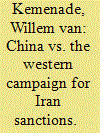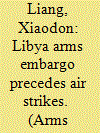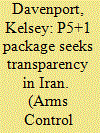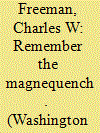| Srl | Item |
| 1 |
ID:
097103


|
|
|
|
|
| Publication |
2010.
|
| Summary/Abstract |
The EU, Israel, and United States have been conducting an intensive campaign of diplomatic skirmishes with Brazil, China, Turkey, and others over imposing sanctions on Iran to stop it from moving from enriching uranium to building nuclear weapons. The sanctions needed to be "crippling" according to U.S. Secretary of State Hillary Rodham Clinton, "massive" according to President Nicolas Sarkozy of France, and "biting" according to Prime Minister Benjamin Netanyahu of Israel.1 Yet, an operational consensus had not been obtained by May 2010. Some in the United States, particularly within Congress, appear willing to be indiscriminate in hitting not only the core of the Iranian regime but also the Iranian people, while Israel is defiantly planning a potentially catastrophic military attack on Iran's nuclear sites even without the consent of the United States.2 On the other hand, Europeans want to be more circumspect and focus on targeting the hard core of Iran's regime rather than its public.
|
|
|
|
|
|
|
|
|
|
|
|
|
|
|
|
| 2 |
ID:
097098


|
|
|
|
|
| Publication |
2010.
|
| Summary/Abstract |
The U.S. government has recently begun to emphasize the need for greater engagement with problem states. Proponents of this approach argue that diplomacy is necessary, even with these regimes. Critics, however, maintain that engagement with these regimes is tantamount to appeasement and signals acceptance of behavior that ought to be condemned. In their view, there is little to be gained by talking to these states. Thus, diplomatic sanctions-or sanctions characterized by political disengagement-are seen as a low-cost means of isolating and delegitimizing regimes.
|
|
|
|
|
|
|
|
|
|
|
|
|
|
|
|
| 3 |
ID:
107366


|
|
|
|
|
| Publication |
2011.
|
| Summary/Abstract |
Members of a UN-authorized coalition began air strikes March 19 against military assets controlled by Libyan leader Moammar Gaddafi, completing an abrupt reversal in relations that until as recently as three months ago involved significant arms sales. With an arms embargo mandated by UN Security Council Resolution 1970 in place since Feb. 26, key coalition members such as France, the United Kingdom, and the United States are now committed to preventing the further influx of weapons to Gaddafi's forces.
|
|
|
|
|
|
|
|
|
|
|
|
|
|
|
|
| 4 |
ID:
121700


|
|
|
|
|
| Publication |
2013.
|
| Summary/Abstract |
The proposal six world powers brought to the April 5-6 talks with Iran over its controversial nuclear program contains transparency measures, including provisions that would require Iran to give inspectors increased access to facilities and provide information to address allegations of possible activities related to making a nuclear bomb, according to a former Iranian nuclear negotiator and two Western diplomats.
|
|
|
|
|
|
|
|
|
|
|
|
|
|
|
|
| 5 |
ID:
086336


|
|
|
|
|
| Publication |
2009.
|
| Summary/Abstract |
In spring 2008, Senator Hillary Rodham Clinton mounted a quixotic but remarkable comeback in her battle for the Democratic presidential nomination against Senator Barack Obama. Although it ultimately fell just short, part of the success of her resurgent campaign was a tilt in her message from policy to populism. Tapping into the hopes and insecurities of the U.S. public, she repositioned herself as champion of the "forgotten" middle class, focusing her message on pocketbook issues, jobs, and popular anxieties about globalization.
|
|
|
|
|
|
|
|
|
|
|
|
|
|
|
|